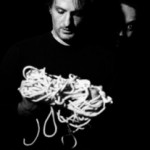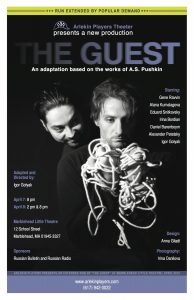
 Article about the production by Alan Shaw.
Article about the production by Alan Shaw.
“This splendid little production, which premiered last December at the Boston Playwrights’ Theatre and had a brief run at the Marblehead Little Theatre this past weekend, is a creation of Igor Golyak, artistic director of the Arlekin Players, a Boston-area-based Russian-American troupe. It is performed in Russian.*
The piece is an adaptation of Pushkin’s “Scene from Faust” and “The Stone Guest.” Aside from Gretchen’s song, lifted from Goethe, the lines are all Pushkin’s. But as Golyak conceives it, Don Juan, the protagonist of “The Stone Guest,” becomes yet another incarnation of Faust. This works surprisingly well, or perhaps not so surprisingly – the two damned souls were often associated with each other in Goethe’s and Pushkin’s time, and have been many times since.
For those unfamiliar with Pushkin’s take on the story, his Faust suffers not so much from a thirst for knowledge and experience as from pure ennui, which Mephistopheles (the Demon) tries in vain to alleviate. In a few brief pages of verse, Pushkin creates a sort of negative image of Goethe’s Faust, a soul of frightening vacuity who can only rouse himself to enthusiasm by sentimentalizing his past, in particular his seduction of Gretchen. At the end of the scene, we see his boredom turn murderous.
Enter Don Juan, back from banishment, at the risk of his life, for killing the Commander in a duel. Why has he returned? Out of boredom. Northern women are “like waxen dolls.” He wants to revisit his Spanish haunts. He looks up Laura, his alter ego, and kills her current conquest in a duel, then fixates on Donna Anna, the widow (not the daughter) of the Commander. Disguised as a monk, he courts her at the monastery where she comes daily to pray at the statue that marks her husband’s grave. She permits him to call on her at home, and his conquest of her is imminent when the statue, responding to his invitation, appears at the door. In Arlekin’s production, things are rounded out with the re-appearance, at Juan’s demise, of the Demon from the Faust scene.
In his verve as a seducer, Pushkin’s character owes a lot to Mozart’s Don Giovanni; what Pushkin adds is a certain virtuosity. As many Russian critics have noted, his Juan is essentially an artist. His conquest of Donna Anna, in which, though completely gratuitous, it is essential to him that she know exactly who he is, becomes his masterpiece, and his swan song.
Virtuosity, it is true, doesn’t seem particularly characteristic of Pushkin’s Faust. But in their inner emptiness, the two characters connect well enough. We can believe that a Faust who can have anything he wants, and is still inclined to see love as a salvation, or at least the ultimate distraction, might choose to become this Don Juan. In any case, Pushkin’s verse is so laconic, so suggestive of hidden essences and possible connections between them, that the transformation feels perfectly plausible. And the Arlekin production, in a minimalist black box set with fluid, easily reconfigured elements, has an elegance to match the poetry.
The cast is uniformly excellent. The director plays the Demon (as well as Don Carlos), and Gene Ravvin plays both Faust and Don Juan.”
Past shows
May 5, 2012: 8pm
JCC in Manhattan
334 Amsterdam ave at 76th st, New York, NY
June 28, 2012: 8pm
EMACT Festival at Chelmsford High
120 Richardson rd., Chelmsford, MA
September 7 and 8, 2012: 7pm
Moscow Art Theatre School
Tverskaya street, 6 build. 7
Moscow, 125009
Directed and adapted by Igor Golyak
* An adaptation of Alexander Pushkin’s “The Stone Guest,” “A Scene from Faust,” and Johann Wolfgang von Goethe’s “Faust.“ ↩









